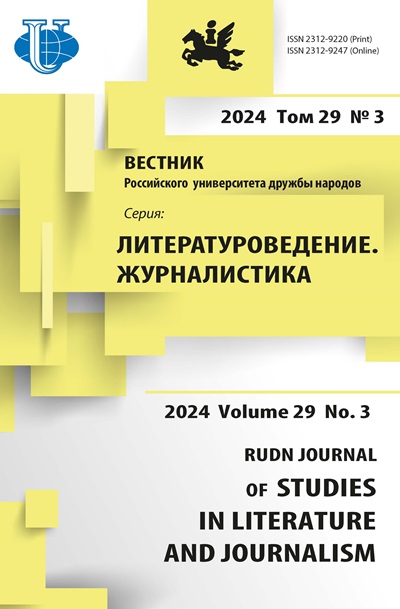Philosophical journalism in new media
- Authors: Yakovlev M.V.1
-
Affiliations:
- Lomonosov Moscow State University
- Issue: Vol 29, No 3 (2024)
- Pages: 551-563
- Section: JOURNALISM
- URL: https://journals.rudn.ru/literary-criticism/article/view/41916
- DOI: https://doi.org/10.22363/2312-9220-2024-29-3-551-563
- EDN: https://elibrary.ru/GDAVNH
Cite item
Full Text
Abstract
In response to the increasing educational role of the media and the growing public demand for educational materials, the author examines Internet resources dedicated to philosophy, including author channels in instant messengers. The concept of modern philosophical journalism is formulated, the uniqueness of the content of Russian and English-language media positioning themselves within the framework of philosophy is revealed. A conclusion is drawn about their peculiarities in working methods and objectives. A comparative content analysis of the publications of ten media projects revealed two strategic directions in the development of philosophical journalism on screen. The first is educational and entertaining, which tends to fulfill two basic functions of journalism: education and entertainment. The second one is scientific and journalistic, which mainly fulfills the educational and informational functions of the media (to a lesser extent the educational function). The first direction is characterized by the intensive use of multimedia components, a focus on presenting the foundations of teachings and explaining basic philosophical concepts, ignoring the current agenda. The second direction uses information opportunities, in philosophical issues there is a connection with the issues of the current agenda, an emphasis on the development of audio podcasts and longreads. Russian journalists connected with philosophical issues are invited to expand their contribution to the development of philosophical journalism on digital resources, bringing them closer to the standards of high-quality publications and increasing the effectiveness of information and journalistic work.
About the authors
Maksim V. Yakovlev
Lomonosov Moscow State University
Author for correspondence.
Email: yakovlevmv@my.msu.ru
ORCID iD: 0000-0002-0127-5642
Doctor of Political Sciences, Professor at the Department of Philosophy of Politics and Law, Faculty of Philosophy
1 Leninskie Gory, Moscow, 119991, Russian FederationReferences
- Bodrunova, S.S. (2023). Cumulative deliberation: new normativity in studying of public spheres online. Bulletin of Moscow University (Series 10. Journalism), 1, 87–122. (In Russ.) https://doi.org/10.30547/vestnik.journ.1.2023.87122
- Bystrov, V.Yu., & Osipov, I.D. (2018). Philosophy and journalism: prolegmon to the philosophical concept of event. Conflictology, 13(3), 160–171. (In Russ.)
- Bystrov, V.Yu., & Sokolov, A.M. (2017). Philosophy and journalism: the concept of event. Bulletin of Saint Petersburg University. Philosophy and Conflictology, 33(3), 266–274. (In Russ.) https://doi.org/10.21638/11701/spbu17.2017.301
- Cohen, E.D. (Ed.) (1992). Philosophical issues in journalism. New York; Oxford: Oxford University Press.
- Goodman, K. (1989). Journalism and Philosophy. Proceedings and Addresses of the American Philosophical Association, 63(1), 35–40. https://doi.org/10.2307/3130332
- Gradyushko, A.A. (2022). Modern journalism in the digital ecosystem: theoretical approaches of foreign media researchers. Journal of Belarusian State University (Journalism), 1, 22–27. (In Russ.)
- Howard, P.N. (2006). New media campaigns and the managed citizen. New York: Cambridge University Press. https://doi.org/10.1017/CBO9780511615986
- Media ecosystem: digital modifications. (2021). Urazova S.L. (ed.) Chelyabinsk: South Ural State University Publ. (In Russ.)
- Osipov I.D. (ed.). (2017). National philosophical journalism. History and modernity. Moscow: Institute for Peace and Conflict Research. (In Russ.)
- Panteau, L. (1996). Philosophical journalism. In: Shmatko N.A. (ed.) Socio-Logos of Postmodernism. Almanac of the Russian-French Centre for Sociological Research of the Institute of Sociology of the Russian Academy of Sciences. Moscow: Institute of Experimental Sociology. P. 30–56. (In Russ.)
- Polyakov, M.L (2023). Interaction of digital platforms and states: events and phenomena 2019–2022. Bulletin of Voronezh State University (“Philology. Journalism” Series), 1, 116–120. (In Russ.)
- Villeneuve, G. (2015). Philosophers in newspapers: about a collaboration between journalists and philosophy professors on the Libé des philosophes. French Journal for Media Research, 3. https://frenchjournalformediaresearch.com/lodel-1.0/main/index.php?id=471
- Vodopetov, S.V., & Makhmud, K.N.M. (2022). Transformation of journalistic activity in the digital era. Successes of the Humanitarian Sciences, 6, 19–25. (In Russ.)
- Volkova, I.I., & Lazutova, N.M. (2017). Screen mass media and human ecology: from enchantment to joining. Bulletin of Orenburg State University, 12(212), 106–111. (In Russ.)
- Vyrkovsky, A.V., & Kolesnichenko, A.V. (2020). New media as platforms for political discourse in the post-Soviet countries. Medi@lmanakh, 1, 48–59. (In Russ.) https://doi.org/10.30547/mediaalmanah.1.2020.4859
- Yakovlev, M.V. (2024). Philosophical journalism in digital media space. In: Proceedings of the International scientific and practical conference “Journalism in 2023: creativity, profession, industry”. Moscow: Moscow State University. P. 35–36. (In Russ.)
















